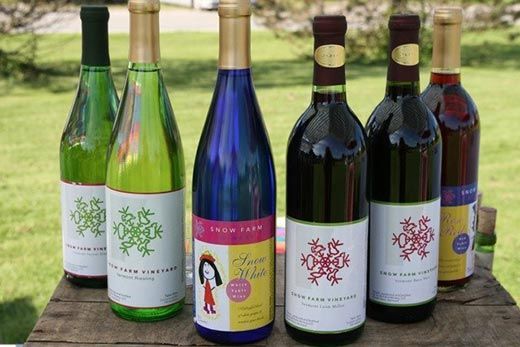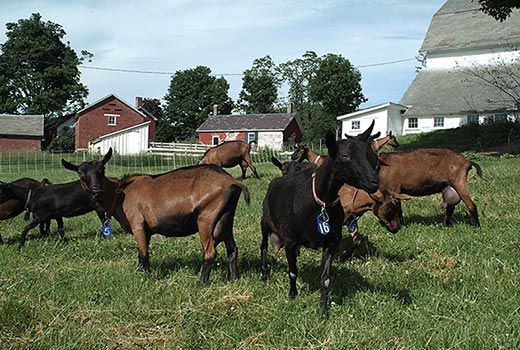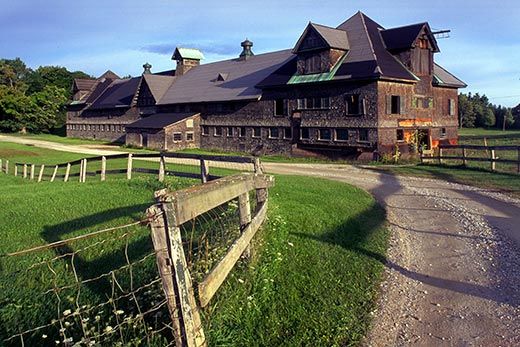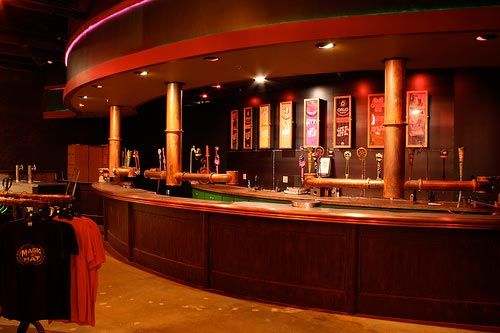A Culinary Adventure in Vermont
Vermont’s roads lead you to dairy farms, vineyards and local breweries for foodies looking for great eats
/https://tf-cmsv2-smithsonianmag-media.s3.amazonaws.com/filer/Consider-Bardwell-goats-631.jpg)
Vermont may be best known for its maple trees—a source of both scenery and syrup—but the Green Mountain State also has a budding reputation as a food scene. With more than 100 gourmet food and beverage producers listed by the Vermont Specialty Foods Association, there’s too much good stuff to digest in one article, but here are a few suggested places to stop, sip and sample on your next visit to the state.
CHEESE
Artisan cheese-making has really taken off in Vermont in the past decade, as evidenced by the University of Vermont’s decision to create an Institute for Artisan Cheese. There are at least 40 makers of cow’s, goat’s, and sheep’s milk cheeses throughout the state; enough to merit a “Vermont Cheese Trail.”
The largest and best-known cheese maker is Cabot, which collects milk from 300 Vermont farms (more than one quarter of all dairy farms in the state) through a cooperative creamery system and uses it to make a range of naturally-aged cheddar cheeses, as well butter and yogurt.
At the Cabot Visitors Center in the northeastern Vermont town of Cabot, you can take a guided factory tour (call ahead to confirm availability: 1-800-837-4261) for $2 per person. You can also taste your way through the product line at the company’s retail outlets in Waterbury and Quechee.
Between May and October, a smaller cheese making operation can be seen at Shelburne Farms, a National Historic Landmark with a gorgeous setting on the shores of Lake Champlain. The 1,400-acre working farm offers both guided property tours and a network of self-guided walking trails. Fees range from $5 to $11 per person. It’s also worth pausing for a night, a meal, or just a peek at the property’s historic inn and associated restaurant.
Near the state’s southwest edge, consider stopping by Consider Bardwell Farm, a 300-acre farm in West Pawlet named after the man who founded the state’s first cheese-making cooperative there back in 1864. These days, it’s run by a couple of ex-Manhattanites whose part-time rural hobby snowballed into a full-time career. Their cheeses – made from the milk of naturally raised Oberhasli goats and Jersey cows – are now featured at restaurants as prestigious as Per Se and the French Laundry. If that sounds like your idea of a dream job, ask about the farm’s two-day artisan cheese making workshops.
WINE
At least a dozen commercial wineries have sprouted in the state over the past 15 years. The oldest grape winery, Snow Farm, opened in 1996 and boasts an unusual growing location: South Hero, a Lake Champlain island said to have a microclimate just like France’s famous Burgundy region. French-American hybrid grapes like Baco Noir thrive during the mild growing season, while ice wine is the sweet silver lining of harsh winters.
Snow Farm vineyard is open for tours and tasting from May through December. You can also taste their wines year-round, along with Cabot cheese and Lake Champlain Chocolates, at the tasting complex on Route 100 in Waterbury (just north of the Ben & Jerry’s factory).
Further inland, looking up at Mount Mansfield from the pleasantly obscure village of Cambridge (pop. 225), Boyden Valley Winery is a long-established family dairy farm that recently re-invented itself as a producer of wine and natural beef. Try their “Cow Tipper” wine, a semi-dry white that resembles a Riesling, or their unique fruit wines made from local cranberries, blueberries, rhubarb and apples.
You can drive to the Boyden Farm, but it might be more fun to arrive by the Lamoille River – Umiak, Bert’s Boats and Green River Canoe all offer guided canoe and kayak trips to the winery.
CHOCOLATE
Founded in 1983, Burlington-based Lake Champlain Chocolates started with a local restaurateur’s desire to find better truffles to give as gifts to his staff, and grew into a gourmet chocolate business with a sizable staff of its own. If you want to see how chocolate is made, catch one a free tour of the company’s Pine Street factory on most weekdays between 9 and 2 p.m. If you’re only interested in the final product, however, you might prefer sampling at the Waterbury tasting complex that includes Cabot cheese and Snow Farm wines.
BEER
Magic is bubbling within an ordinary-looking warehouse on the outskirts of Burlington. Started in 1994, Magic Hat is now among the 15 largest breweries in the nation, according to the Brewers Association’s rankings by sales volume. Their Burlington facility conjures about 400 bottles per minute; you can watch the action on a tour, or just stop by the gift shop and tasting room for a spell.
For a "passport" to visit other Vermont breweries, visit the Vermont Brewers Association.




